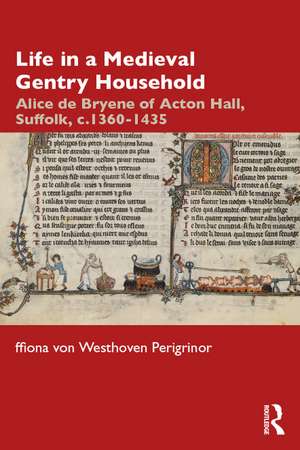Life in a Medieval Gentry Household: Alice de Bryene of Acton Hall, Suffolk, c.1360-1435
Autor ffiona von Westhoven Perigrinoren Limba Engleză Paperback – 26 noi 2021
[Originally published in 1999 by Sutton Publishing Limited (UK) and Routledge Kegan Paul (USA) as Medieval Gentlewoman: Life in a Widow’s Household in the Later Middle Ages by ffiona Swabey.]
Preț: 295.73 lei
Nou
Puncte Express: 444
Preț estimativ în valută:
56.59€ • 59.23$ • 47.10£
56.59€ • 59.23$ • 47.10£
Carte disponibilă
Livrare economică 10-24 martie
Livrare express 22-28 februarie pentru 30.24 lei
Preluare comenzi: 021 569.72.76
Specificații
ISBN-13: 9781032030418
ISBN-10: 1032030410
Pagini: 220
Ilustrații: 13 Halftones, color; 48 Halftones, black and white; 13 Illustrations, color; 48 Illustrations, black and white
Dimensiuni: 156 x 234 x 19 mm
Greutate: 0.39 kg
Ediția:1
Editura: Taylor & Francis
Colecția Routledge
Locul publicării:Oxford, United Kingdom
ISBN-10: 1032030410
Pagini: 220
Ilustrații: 13 Halftones, color; 48 Halftones, black and white; 13 Illustrations, color; 48 Illustrations, black and white
Dimensiuni: 156 x 234 x 19 mm
Greutate: 0.39 kg
Ediția:1
Editura: Taylor & Francis
Colecția Routledge
Locul publicării:Oxford, United Kingdom
Public țintă
Academic, Postgraduate, and Undergraduate AdvancedCuprins
1. The Medieval Household 2. Marriage and the Family 3. Estate Management 4. The Gentle Lifestyle 5. Men at the Table 6. Women at the Table 7. The Wider World 8. Considerations for the Afterlife Epilogue
Notă biografică
ffiona von Westhoven Perigrinor is an independent scholar and Jungian psycho-analyst. Her previous publications include: Reluctant Pilgrim: the Lost Book of Margery Kempe’s Maidservant (2021) and Strange Tales from my Studio: a Psychotherapist in China (forthcoming). And under her pen-name ffiona Swabey: Eleanor of Aquitaine, Courtly Love and the Troubadours (2004) and Medieval Gentlewoman: Life in a Widow’s Household in the Later Middle Ages (1999). www.perigrinor.co.uk
Recenzii
‘Written in a lively and accessible style, this book appeals not only to scholars of the period but very much to the general reader with interests in such matters as marriage and family, the stages of life including widowhood, and the lifestyle of the gentry, both in the material sense and in terms of attitudes and values’ - Peter R. Coss, Emeritus Professor of Medieval History, Cardiff University.
'Who would have thought that a simple household account, for the single year 1412–13, could be used to produce such a rich and readable book? Dame Alice de Bryene’s enterprising engagement and her busy household are brought to life in a way that is both scholarly and enlightening. A remarkable achievement' - Caroline Barron, Professor Emerita, Royal Holloway, University of London.
'When this book of daily life in the household of an affluent widow first appeared it anticipated much of the scholarship that has followed. As our interest in "ordinary" lives continues to grow, ffiona Perigrinor’s study of Alice de Bryene remains central to many lines of investigation touching the kitchen and banqueting hall, guests at the table, relations with the clergy, and an active widow's role in family and community life. This was a book before its time' - Joel T. Rosenthal, Emeritus Professor, Stony Brook University.
‘The detailed research reveals the rhythms of farm life in the Suffolk countryside, explores in detail the management and economics of a gentry household, and uncovers the web of personal and religious obligations that also marked the year for Dame Alice and her household... Dr Perigrinor brings her material beautifully to life’ – Martha Carlin, Professor of History, University of Wisconsin–Milwaukee.
‘The use of the accounts, contemporary manuals and literature provide a compelling picture of Alice’s life—much is made of the way she managed her household and estates, her lifestyle, and the importance of display. How did this differ from a man’s approach? The scale might have been different, but the expectations of good ladyship were little different from those associated with good lordship.’ – The Local Historian, October 2022.
'Who would have thought that a simple household account, for the single year 1412–13, could be used to produce such a rich and readable book? Dame Alice de Bryene’s enterprising engagement and her busy household are brought to life in a way that is both scholarly and enlightening. A remarkable achievement' - Caroline Barron, Professor Emerita, Royal Holloway, University of London.
'When this book of daily life in the household of an affluent widow first appeared it anticipated much of the scholarship that has followed. As our interest in "ordinary" lives continues to grow, ffiona Perigrinor’s study of Alice de Bryene remains central to many lines of investigation touching the kitchen and banqueting hall, guests at the table, relations with the clergy, and an active widow's role in family and community life. This was a book before its time' - Joel T. Rosenthal, Emeritus Professor, Stony Brook University.
‘The detailed research reveals the rhythms of farm life in the Suffolk countryside, explores in detail the management and economics of a gentry household, and uncovers the web of personal and religious obligations that also marked the year for Dame Alice and her household... Dr Perigrinor brings her material beautifully to life’ – Martha Carlin, Professor of History, University of Wisconsin–Milwaukee.
‘The use of the accounts, contemporary manuals and literature provide a compelling picture of Alice’s life—much is made of the way she managed her household and estates, her lifestyle, and the importance of display. How did this differ from a man’s approach? The scale might have been different, but the expectations of good ladyship were little different from those associated with good lordship.’ – The Local Historian, October 2022.
Descriere
Using the household accounts of Alice de Bryene, a widowed gentlewoman, together with bailiffs’ and stewards’ reports from her home in Suffolk and other estates further afield, this richly detailed study paints a vivid portrait of the lives of ordinary people in the medieval countryside.
